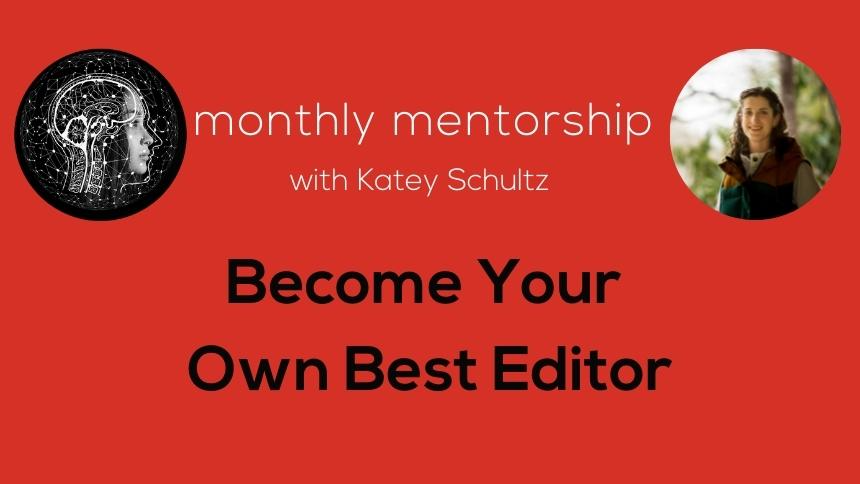Be Your Own Best Editor by Katey Schultz
By WU Advertiser | January 23, 2022 |
Hi, I’m Katey and I support writers by teaching them how to apply thinking to language and integrate writing into their lives, sustainably. When I talk to writers, they often tell me they struggle with the revision process: what to change, why to change it, and how. In my Monthly Mentorship course, I help writers identify the invisible, decision-making moments of their creative processes. From there, I teach them how to use a unique, introspective process that helps them make their next best move on the page, over and over again.
When students run into craft concerns, rather than shoot an email to a friend or give up, I teach them how to coach themselves by naming the challenge, then reflecting on the decisions made that brought them to that point. If we can name the decisions, we can then question them, which allows a space for a different decision–perhaps a more effective one–to arise. From there, we can write our way forward and see how this slight pivot feels. If it still doesn’t feel clear, I encourage students to learn how to leave their cues on the page and write past the trouble spot, trusting that they have tools for returning to it later. A foundational concept of Monthly Mentorship is that writers don’t have to solve all the challenges or make every word perfect before moving on. I believe writers need to learn to trust that writing is fluid and circuitous, and clarity comes in waves.
This is an important concept because if we stop writing, if we think we can’t solve problems without external input, we’ll never experience that deeply private, deeply impactful, sense of momentum. We’ll never coach ourselves and we’ll never learn how to become our own best editor.
This kind of work is invisible to our readers and publishers, and that’s fine. They read for entertainment and discovery, which is what we want. They don’t need to be able to see the micro-decisions we make along the way. But we need to be able to see them.
That’s why being coached in how to coach ourselves is an absolute must when it comes to successfully writing for the long haul. It empowers us to become better writers on our own…not just for one project, but for every project…and we can do so with confidence as the years unfold.
Because I’ve taught my Monthly Mentees the structural components of prose and they’ve seen how other writers in their Mentorship cohort work with this concept, they can now take that tool and make it their own. Flash forward five years and onto a different writing project, the writer has that tool for herself and knows immediately to modify it to that manuscript’s needs, and proceed. They’ve become their own best editor.
If you’re ready for the deeper dive, explore what Monthly Mentorship is all about right here, then fill out the questionnaire and I’ll reach out for a free video or phone consult to discuss your goals, needs, and the best path toward becoming your own best editor, for life. The program for 2022-23 is already filling, and applications are reviewed on a rolling basis.











Everything depends on everything else. I agree with all of this – and do my best version of it – except that I lack the ability to ‘leave cues’ and come back to something. I’m a spelunker with a long-lasting battery to a dim flashlight: I can only focus on the small area around and in front of me.
So, I stick with it, writing out the problems, until the current conundrum’s solved. Inefficient, maybe (I still have the incredibly rough first draft of the whole, and it’s remarkable to me that I had so much of it right twenty years ago), but a damaged brain limits what you CAN do, so I accept that, and still write.
Wish I’d had someone like you before I figured most of this out the hard way!
Alicia–thanks for this! I’d love to talk more about how I teach my writers in Monthly Mentorship to FIND THE CUES (clues?) they leave for themselves in their early drafts, so that they can start to coach themselves toward getting at what’s under the under (the deeper meaning) of what a piece of writing is really trying to say. Let me know if you want to talk…what you’re describing here works for most, and I see you saying it works for you–hey…if it ain’t broke….BUT…there are indeed some things writers can do to find the cues/clues themselves. :-)